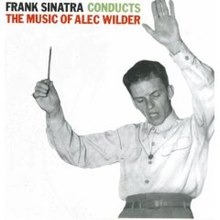The Columbia Symphony Orchestra was an orchestra formed by Columbia Records strictly for the purpose of making recordings. In the 1950s, it provided a vehicle for some of Columbia's better known conductors and recording artists to record using only company resources. The musicians in the orchestra were contracted as needed for individual sessions and consisted of free-lance artists and often members of either the New York Philharmonic or the Los Angeles Philharmonic, depending on whether the recording was being made in Columbia's East Coast or West Coast studios.
The 2nd Annual Grammy Awards were held on November 29, 1959, at Los Angeles and New York. They recognized musical accomplishments by performers for the year 1959. Hosted by Meredith Willson, this marked the first televised Grammy Award ceremony, and it was aired in episodes as special Sunday Showcase. It was held in the same year as the first Grammy Awards in 1959, and no award ceremony was held in 1960. These awards recognized musical accomplishments by performers for that particular year. Frank Sinatra and Duke Ellington each won three awards.
The 8th Annual Grammy Awards were held March 15, 1966, at Chicago, Los Angeles, Nashville and New York. They recognized accomplishments of musicians for the year 1965. Roger Miller topped off the Grammys by winning 5 awards, whereas Herb Alpert and Frank Sinatra each won 4 awards.
The 9th Annual Grammy Awards were held on March 2, 1967, at Chicago, Los Angeles, Nashville and New York. They recognized accomplishments of musicians for the year 1966. The 9th Grammy Awards is notable for not presenting the Grammy Award for Best New Artist. Frank Sinatra won 5 awards.
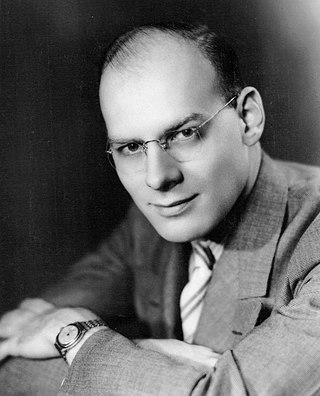
Mitchell William Miller was an American choral conductor, record producer, record-industry executive, and professional oboist. He was involved in almost all aspects of the industry, particularly as a conductor and artists and repertoire (A&R) man. Miller was one of the most influential people in American popular music during the 1950s and early 1960s, both as the head of A&R at Columbia Records and as a best-selling recording artist with an NBC television series, Sing Along with Mitch. A graduate of the Eastman School of Music of the University of Rochester in the early 1930s, Miller began his musical career as a player of the oboe and English horn, making numerous highly regarded classical and popular recordings.
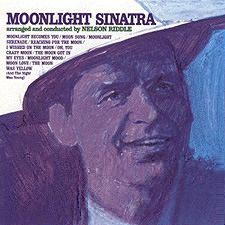
Moonlight Sinatra is a studio album by Frank Sinatra, released in March 1966. All of the tracks on the album are centered on the Moon, and were arranged and conducted by Nelson Riddle and his orchestra.

September of My Years is a 1965 studio album by American singer Frank Sinatra, released on Reprise Records in August 1965 on LP and October 1986 on CD. The orchestral arrangements are by Gordon Jenkins, their fifth album collaboration. It peaked at No. 5 on the Billboard Pop Albums chart.

The Voice of Frank Sinatra is the debut studio album by American singer Frank Sinatra, released on Columbia Records, catalogue C-112, March 4, 1946. It was first issued as a set of four 78 rpm records totaling eight songs, the individual discs given Columbia 78 catalog numbers 36918, 36919, 36920, and 36921. The album went to number 1 on the fledgling Billboard chart. It stayed at the top for seven weeks in 1946, spending a total of eighteen weeks on the charts. The album chart consisted of just a Top Five until August 1948. The cover depicted is that of the original 78 rpm release cover, also used on the compact disc reissue.

Frankly Sentimental is the fourth studio album by Frank Sinatra, released on June 20, 1949 as a set of four 78 rpm records and a 10" LP album.
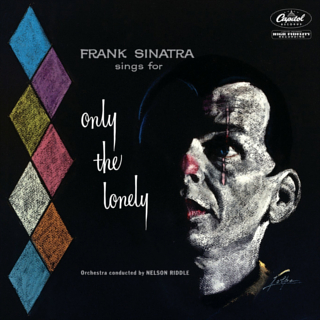
Frank Sinatra Sings for Only the Lonely is an album by Frank Sinatra.

I Remember Tommy... is an album by Frank Sinatra, released in 1961. It was recorded as a tribute to bandleader Tommy Dorsey, and consists of re-recorded versions of songs that Sinatra had first performed or recorded with Dorsey earlier in his career. Fellow Dorsey alumnus Sy Oliver arranged and conducted the sessions.
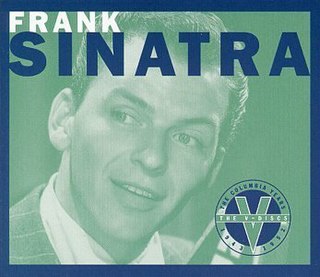
The Columbia Years 1943–1952: The V-Discs is a 1994 compilation album by the American singer Frank Sinatra. It was released as a "long box" box set in 1994 and re-released in a jewel box size in 1998.

Alexander Lafayette Chew Wilder was an American composer.
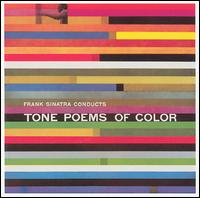
Frank Sinatra Conducts Tone Poems of Color is a 1956 album of short tone poems by eight notable mid-20th century Hollywood composers.
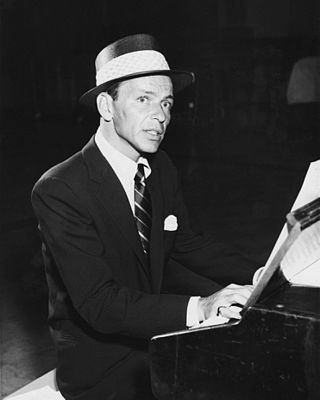
Frank Sinatra's musical career began in the swing era in 1935, and ended in 1995, although he did briefly retire in 1971, before returning to music in 1973. Sinatra is one of the most influential music artists of the 20th century, and has sold 150 million records worldwide, making him one of the best-selling music artists of all-time. Rock critic Robert Christgau called Sinatra "the greatest singer of the 20th century". In addition to his music career, Sinatra was also a successful film actor, having won the Academy Award for Best Supporting Actor for his role as Private Angelo Maggio in From Here to Eternity (1953).
"I'll Be Around" is a popular song written by Alec Wilder and published in 1942. It was first recorded by Cab Calloway and his Orchestra in 1942 and the first hit version was by The Mills Brothers in 1943 when it reached No. 17 in the Billboard pop charts. The song has become a well-known standard, recorded by many artists.
"Indian Summer" is an American standard originally written as a piano piece by the prolific composer Victor Herbert. Al Dubin wrote lyrics for the tune in 1939, twenty years after Herbert wrote the tune.

Sinatra: New York is a 2009 box set album of live performances by the American singer Frank Sinatra, recorded in New York City, both at the Carnegie Hall, and at Madison Square Garden.

Sinatra: London is a 3CD & 1DVD Frank Sinatra box set released on November 25, 2014. It is the third in a series of city-themed box sets following Vegas and New York. The set includes the 1962 album Sinatra Sings Great Songs from Great Britain as recorded in London, as well as unreleased outtake material from those sessions and spoken introductions for each song intended for a BBC radio special. The live material consists of a 1953 session from BBC Radio's The Show Band Show, a full concert recorded in 1984 at the Royal Albert Hall, and two concerts on the DVD, both recorded at the Royal Festival Hall in 1962 and 1970. The liner notes are written by Ken Barnes.
"American Beauty Rose" is a 1950 song written by Hal David, Redd Evans and Arthur Altman, which was a minor hit for Eddy Howard and for Frank Sinatra in 1950. It was also popularized by Sinatra's second version as a charting single in 1961. The song was included on his Come Swing with Me! LP, as the B-side to "Sentimental Journey".
